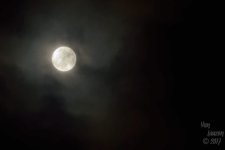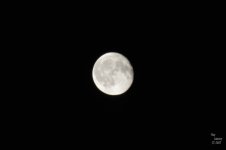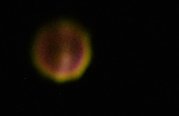You are using an out of date browser. It may not display this or other websites correctly.
You should upgrade or use an alternative browser.
You should upgrade or use an alternative browser.
Astrophotography gear?
- Thread starter Yan Lauzon
- Start date
[MENTION=44173]Yan Lauzon[/MENTION]
The fastest glass you can afford is a two fold benefit. First, You're trying to collect light that is ever so faint. Add to it, DX sensors have more ISO noise than full frame so the more light you can get is a shorter exposure and less noise.
Second, exposure time. The longer you have to have the shutter open the more star movement (star trails) you have. It is a fine balancing act between long enough to collect enough light, but not too long to get noticeable movement, and not having to crank up the ISO to create a noisy image. It's like a waiter carrying a very full tray on one hand. When it's all balanced out it works well. Get it wrong and it all crashed down.
can you please explain to Yan as to why an f/2.8 lens is preferred over f/3.5? Since I've never taken any long exposures like these require, it would help him make an informed decision. If he chooses to go with some type of wide lens that isn't as fast as an f/2.8 lens, he will get an idea of what he is sacrificing. Thanks!
The fastest glass you can afford is a two fold benefit. First, You're trying to collect light that is ever so faint. Add to it, DX sensors have more ISO noise than full frame so the more light you can get is a shorter exposure and less noise.
Second, exposure time. The longer you have to have the shutter open the more star movement (star trails) you have. It is a fine balancing act between long enough to collect enough light, but not too long to get noticeable movement, and not having to crank up the ISO to create a noisy image. It's like a waiter carrying a very full tray on one hand. When it's all balanced out it works well. Get it wrong and it all crashed down.
Moon Photography
Moon photography is often done poorly in that it's too often blown out. When shooting the moon you want to be exposing for the moon, spot exposure metering. If you meter for the moon and all of the black of the sky it will blow out the moon. You will be surprised at how fast your shutter speed is.
When shooting the moon use your histogram to make sure you are not blowing it out.
Moon photography is often done poorly in that it's too often blown out. When shooting the moon you want to be exposing for the moon, spot exposure metering. If you meter for the moon and all of the black of the sky it will blow out the moon. You will be surprised at how fast your shutter speed is.
When shooting the moon use your histogram to make sure you are not blowing it out.
Yan Lauzon
Senior Member
I did a try at the moon with my kit 55-200mm and had difficulty focusing right. (to my defense, it was -35 and was freezing so I didn't try super long, plus cloud went in the way while I was setting up)Moon Photography
Moon photography is often done poorly in that it's too often blown out. When shooting the moon you want to be exposing for the moon, spot exposure metering. If you meter for the moon and all of the black of the sky it will blow out the moon. You will be surprised at how fast your shutter speed is.
When shooting the moon use your histogram to make sure you are not blowing it out.
I had issues getting bright enough, but not too bright. I realize I could have tried histogram to help this out, thanks for the idea, I'll try that as soon as I get a cloudless moon again.
Here's one of the better shots. The moon lights too much on some area and trying to tone it down wasn't easy.
Should we aim for large aperture, or small aperture? What would be the best approach?
I figure I need at least 500mm to try and get where I want to, zoom-wise. There are mirror lens about that size, reminds me of Schmidt Casgrain telescope... Any good for moon pictures?

Last edited:
Yan Lauzon
Senior Member

Here's another try. Is the exif visible now?
I was trying to focus on the moon, didn't think to use the border. Good idea. I realize it's hard to focus to infinity with this lens, I'll have to give this a few more try to get better at it.
Ideally without clouds next time. They spooked in while I was setting up.
Last edited:
Yan Lauzon
Senior Member
1/13 sec, with -1.333 EV compensationWhat was your shutter speed? Nikonites site garbled it.
f/5.6
I also did some work from the raw file in viewNX
Dawg Pics
Senior Member
Shooting the moon is like shooting a light bulb. If you look at the moon with a telescope and don't put a moon filter on, when you look away, you will see spots. Ha
I started by looking at a few images I liked and used the EXIF data provided to start. Then I did some adjustments from there. It just kind of gives an idea of what is happening with shutter, aperture and ISO for different shooters.
Take a look at this one shot with a D3200.
https://nikonites.com/low-light-and-night/2361-moon-shots-18.html#post221277
I started by looking at a few images I liked and used the EXIF data provided to start. Then I did some adjustments from there. It just kind of gives an idea of what is happening with shutter, aperture and ISO for different shooters.
Take a look at this one shot with a D3200.
https://nikonites.com/low-light-and-night/2361-moon-shots-18.html#post221277
Yan, since you mentioned wanting to photograph the next eclipse, keep watch of solar filters or read up on how to make your own. Moab Man said he created one himself. From what I've seen, solar filters tend to be around 15.5 stops (the sun's rays are too intense for sensors). You can also stack a couple of ND filters as long as they total at least 15.5 stops. If you don't use a filter when photographing the sun, then most likely you will damage your sensor.
Filters specifically designed for solar images really would be your best bet. They may contain specific solar filtering that general ND filters lack.
Here is the thread from last year's eclipse: https://nikonites.com/general-photo...se-shots.html?highlight=eclipse#axzz58sgIYTyK
Filters specifically designed for solar images really would be your best bet. They may contain specific solar filtering that general ND filters lack.
Here is the thread from last year's eclipse: https://nikonites.com/general-photo...se-shots.html?highlight=eclipse#axzz58sgIYTyK
Yan Lauzon
Senior Member
Thanks Hark. I plan on getting a solar filter. That's why I am starting to get geared up a few years ahead, that way I should have time to get all I need...
Moab Man stated some "solar filters" of non-brands aren't what they pose to be, and cause issues, so I'll focus on getting something reliable. DIY or pre-made. I guess the first step is to get the lens to mount it on.
Moab Man stated some "solar filters" of non-brands aren't what they pose to be, and cause issues, so I'll focus on getting something reliable. DIY or pre-made. I guess the first step is to get the lens to mount it on.
Last edited:
Dawg Pics
Senior Member
Thanks Hark. I plan on getting a solar filter. That's why I am starting to get geared up a few years ahead, that way I should have time to get all I need...
Moab Man stated some "solar filters" of non-brands aren't what they pose to be, and cause issues, so I'll focus on getting something reliable. DIY or pre-made. I guess the first step is to get the lens to mount it on.
There were a bunch of people selling faked solar viewers on Amazon. They were even clever enough to fake the standards on the cardboard.
Baader products are reliable if they are purchased from an authorized dealer.
Yan Lauzon
Senior Member
I have read a lot about reflex lens and still am unsure of what to think. There are rather affordable mirror 500mm lens out there that I think would be interesting for moon and/or sun/eclipse shots.
Some say they are great for such shots, with their aperture and low chromatic aberration; while others say they can't be as sharp (although I have seen rather nice moon shots with at least one of them so I guess it depends on the lens)
Anyone has hands on experience on these that could comment please?
Some say they are great for such shots, with their aperture and low chromatic aberration; while others say they can't be as sharp (although I have seen rather nice moon shots with at least one of them so I guess it depends on the lens)
Anyone has hands on experience on these that could comment please?


